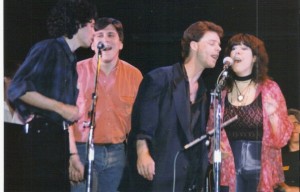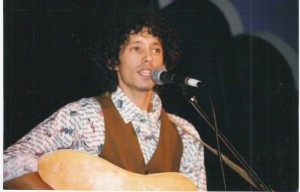Besides recording half a dozen albums of his own — including The Good Life (1992) and A Letter from The Open Sky (1994) for the Shanachie label, Meyer was engaged in producing concert and radio programs, was a lighting and set designer for theater productions a painter and a sculptor, wrote reviews for All Music Guide, and edited the Fast Folk Musical Magazine, a combination publication and recording that the late singer-songwriter Jack Hardy had founded in 1982 to help document serious, noncommercial songwriting in the U.S. and provide an outlet for many singer-songwriters to release their first recordings. Over the course of 15 years, Fast Folk, which also served as a performing songwriters cooperative/community, published 105 issues and featured compilation recordings of more than 2000 songs by more than 600 writers – including notables like Suzanne Vega, Tracy Chapman, Shawn Colvin, John Gorka, Lucy Kaplansky, Lyle Lovett, and Buddy Mondlock as well as numerous other performing songwriters who never became well known. Meyer also was the prime mover and visionary behind the successful effort to have Smithsonian Folkways maintain and preserve Fast Folk’s 100+ back issues.
“Fast Folk Musical Magazine would not have survived for all those many years without Richard keeping it going,” recalled NYC-based singer-songwriter Judith Zweiman, who recorded and played some duo gigs with him, joined him in the group Folkano, and shared many private jokes and puns. “One of the most creative people I’ve ever known, Richard Meyer quietly kept the Fast Folk home fires burning… The Smithsonian project was Richard’s idea and he made it happen,” she continued, expressing thanks to him “for having the vision to permanently preserve not only your own music but an entire folk scene.”

Folkano (Richard Meyer, Josh Joffen, Hugh Blumenfeld and Judith Zweiman) perform during a Fast Folk Revue at The Bottom Line in New York City (photo: Teddy Lee)
Referring to Meyer as “a librarian and archivist at heart,” Zweiman said “Richard was about documenting an era. This was not about him but about the collective work of a group of people.” Describing him as quiet and unassuming, she continued: “Richard was not a person who tooted his own horn, yet he was the underpinning of what kept Fast Folk going. If Jack Hardy was its public face, Richard was the worker bee. He was the one who organized the recording sessions and put the magazine together. He was a quietly loyal and devoted person who was really supportive of people in very intangible but direct ways.” She noted that Meyer also was a “one guitar guy, who was loyal to his Goya guitar and played it his whole life.”
In a post on his brother’s Facebook page announcing Richard’s death yesterday, Ted Meyer acknowledged the “long, slow and debilitating decline of both his physical and mental acuity from the days when he was singing and writing songs, while noting that “Richard remained Richard pretty much until the end. Though he had terrible trouble getting his thoughts out, on occasion he would gather all his strength and roll out a typically bad pun, and he still loved listening to music.”
Richard Meyer spent the past several years at a New York area nursing home after a rare and advancing form of Parkinson’s disease left him unable to perform and made it impossible for him to live independently. His family has donated his body to Yale Medical School and the National Institute for Health for research, expressing hope that in death he can help others. There will not be a funeral, although Meyer’s family plans to hold a memorial at a future date. “We hope everyone will show up with guitars and be ready to sing one of his songs, or at least one of Dylan’s,” Ted Meyer posted on Facebook. “Either would have made him happy.”


Like/Follow Us!